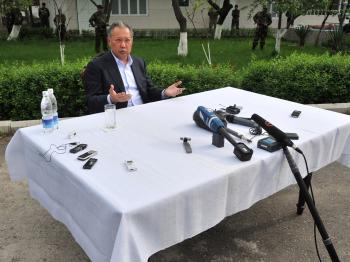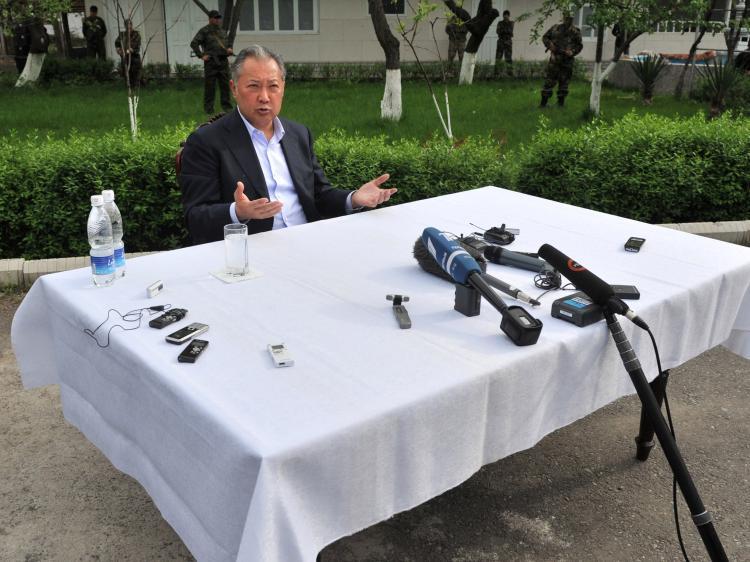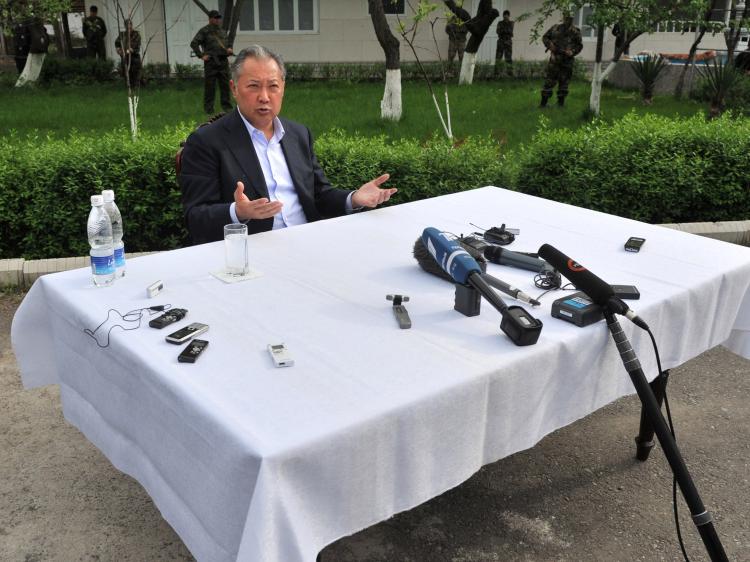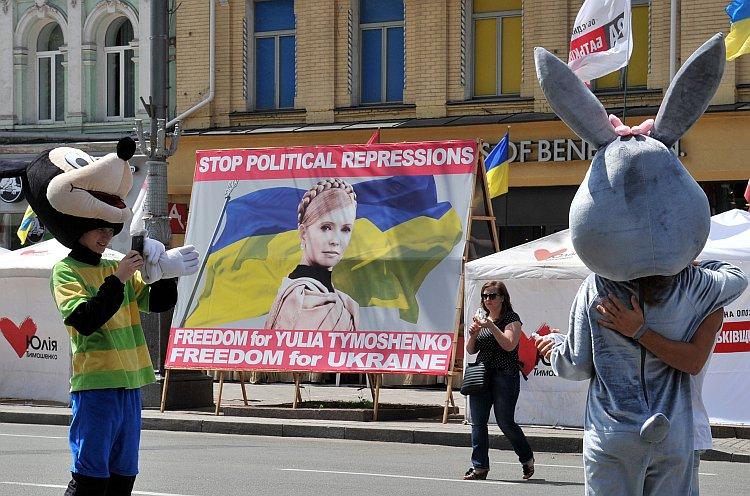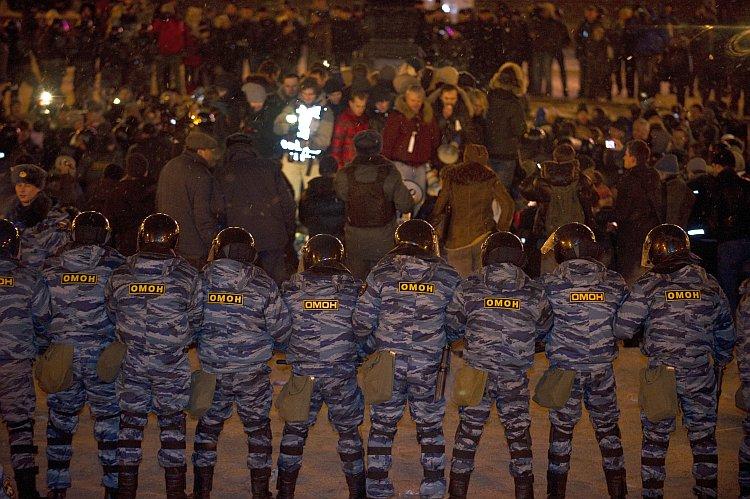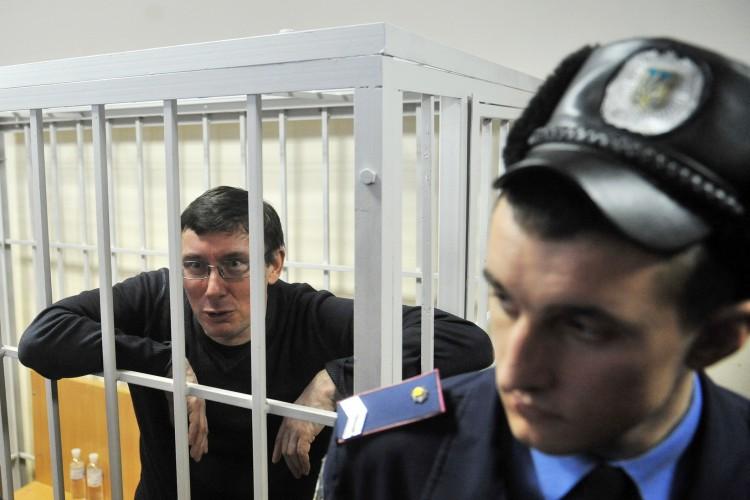Deposed Kyrgyzstan President Kurmanbek Bakiyev told journalists on Tuesday that he was ready to step down if the self-declared interim government puts an end to the “armed lawlessness” across the country, and guarantees him personal safety.
“I think the first important thing is a guarantee that these armed people stop roaming the country,” Reuters reported. “The second is a guarantee of my own safety along with my family’s.”
There have been conflicting reports about the opposition’s willingness to negotiate.
Bakiyev is in his native village of Teyit in Jalal-Abad, southern Kyrgyzstan. He has dozens of his supporters around him armed with the guns. On Tuesday, he organized a protest joined by several thousands people.
The deposed president made his statement after the country’s new authorities canceled his immunity status and threatened to arrest him for the deaths of opposition supporters after violent clashes last week that left 90 dead and hundreds injured.
Bakiyev rejects the so-called interim government and still considers himself to be president. He denies the accusations against him and has called for an international committee to investigate last week’s crimes.
Earlier, the opposition was reported to be preparing a special operation to remove Bakiyev if he refused to resign. Bakiyev warned that if force is used against him, bloodshed could occur again.
Bakiyev, who came to power himself in a coup in 2005, had promised democratic developments. He was condemned by the opposition for soaring utility prices, imposing media restrictions, and for concentrating power into his own hands.
Analysts say that if the political confrontation is not resolved, the situation in Kyrgyzstan could trigger a destabilization in the entire Central Asia region.
Russia has always considered the region to be its territory, competing with China and the United Staes for strategic energy resources and transit routes.
Both Russia and the United States have military bases in the impoverished country of 5 million people.
The latest violence raised fears in Washington that the U.S. air base at the Kyrgyzstan national airport in Manas, which serves as an important transit center for troops and warplanes going to Afghanistan, could be jeopardized.
Bakiyev had planned last year to close the base after obtaining financial support from Moscow. But he later agreed to allow it to stay in exchange for higher rents.
The leader of the interim Kyrgyz government Roza Otunbayeva has assured the White House that the new regime would not cancel any previously reached agreements.
Some Kyrgyz opposition leaders who are outside the country, say that what happened there was a national democratic uprising and are calling other countries to support the process instead of paying attention only to economics and self interest.
“If the democratic revolution in Kyrgyzstan is suppressed, the regimes in the region will look similar to Saddam Hussein’s regime that cost billions in financial and human resources to the West,” said the Washington-based leader of the Socialist Party “Ata Meken” Yerzhan Dosmuhamedov in an interview with Radio Svoboda.
“I think the first important thing is a guarantee that these armed people stop roaming the country,” Reuters reported. “The second is a guarantee of my own safety along with my family’s.”
There have been conflicting reports about the opposition’s willingness to negotiate.
Bakiyev is in his native village of Teyit in Jalal-Abad, southern Kyrgyzstan. He has dozens of his supporters around him armed with the guns. On Tuesday, he organized a protest joined by several thousands people.
The deposed president made his statement after the country’s new authorities canceled his immunity status and threatened to arrest him for the deaths of opposition supporters after violent clashes last week that left 90 dead and hundreds injured.
Bakiyev rejects the so-called interim government and still considers himself to be president. He denies the accusations against him and has called for an international committee to investigate last week’s crimes.
Earlier, the opposition was reported to be preparing a special operation to remove Bakiyev if he refused to resign. Bakiyev warned that if force is used against him, bloodshed could occur again.
Bakiyev, who came to power himself in a coup in 2005, had promised democratic developments. He was condemned by the opposition for soaring utility prices, imposing media restrictions, and for concentrating power into his own hands.
Analysts say that if the political confrontation is not resolved, the situation in Kyrgyzstan could trigger a destabilization in the entire Central Asia region.
Russia has always considered the region to be its territory, competing with China and the United Staes for strategic energy resources and transit routes.
Both Russia and the United States have military bases in the impoverished country of 5 million people.
The latest violence raised fears in Washington that the U.S. air base at the Kyrgyzstan national airport in Manas, which serves as an important transit center for troops and warplanes going to Afghanistan, could be jeopardized.
Bakiyev had planned last year to close the base after obtaining financial support from Moscow. But he later agreed to allow it to stay in exchange for higher rents.
The leader of the interim Kyrgyz government Roza Otunbayeva has assured the White House that the new regime would not cancel any previously reached agreements.
Some Kyrgyz opposition leaders who are outside the country, say that what happened there was a national democratic uprising and are calling other countries to support the process instead of paying attention only to economics and self interest.
“If the democratic revolution in Kyrgyzstan is suppressed, the regimes in the region will look similar to Saddam Hussein’s regime that cost billions in financial and human resources to the West,” said the Washington-based leader of the Socialist Party “Ata Meken” Yerzhan Dosmuhamedov in an interview with Radio Svoboda.
